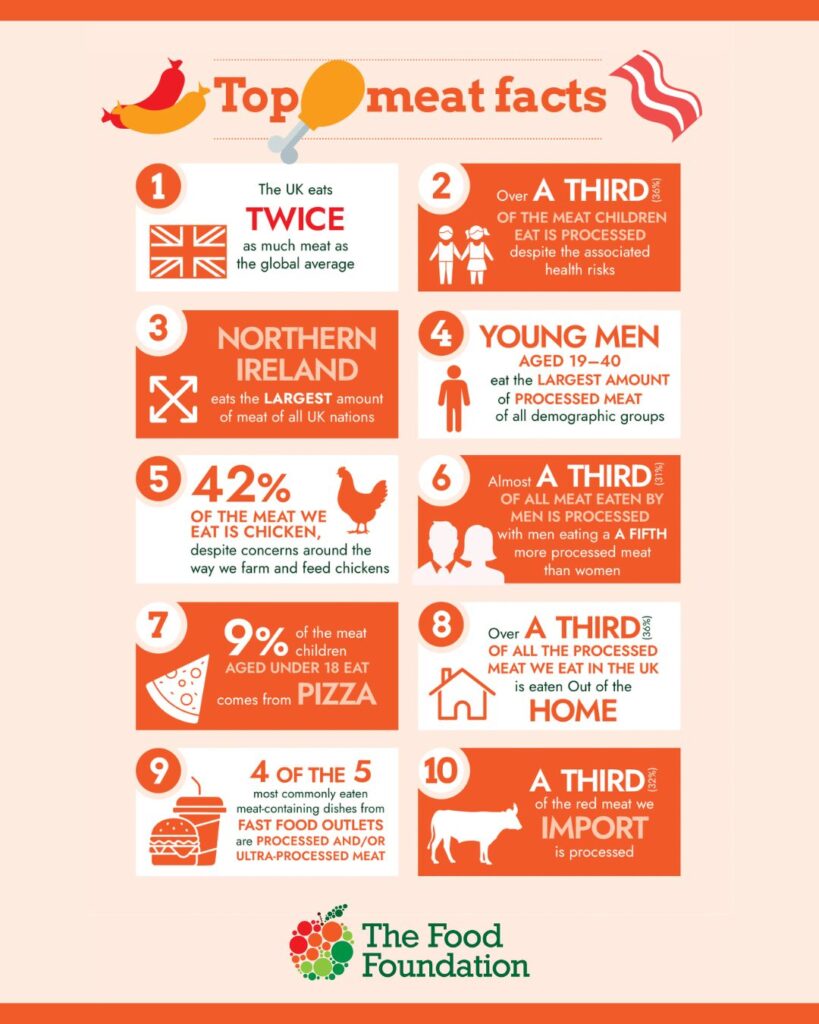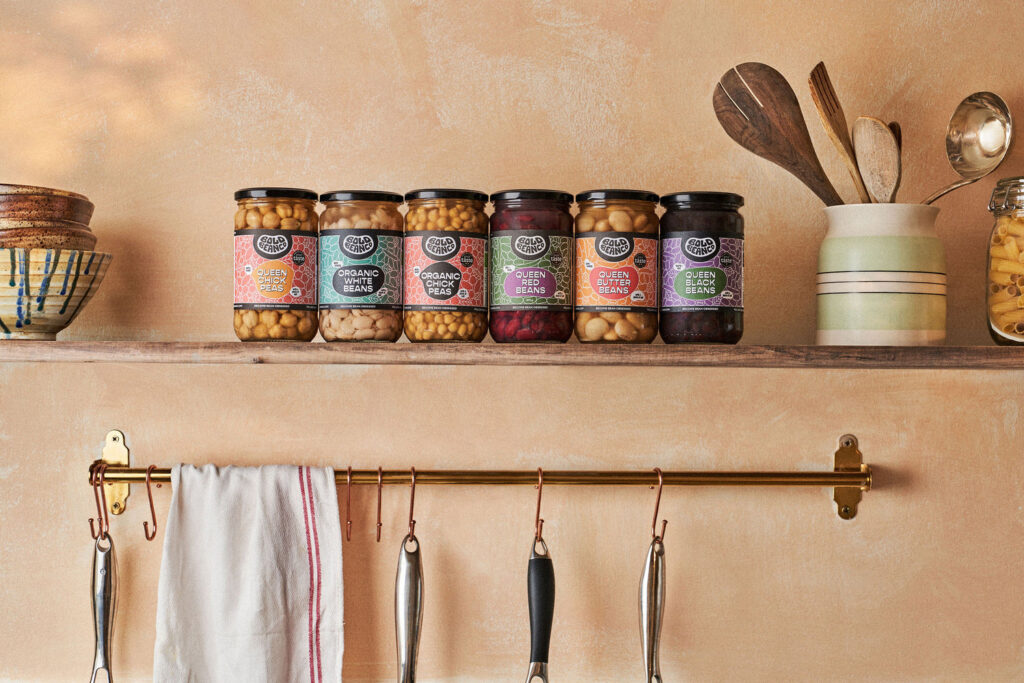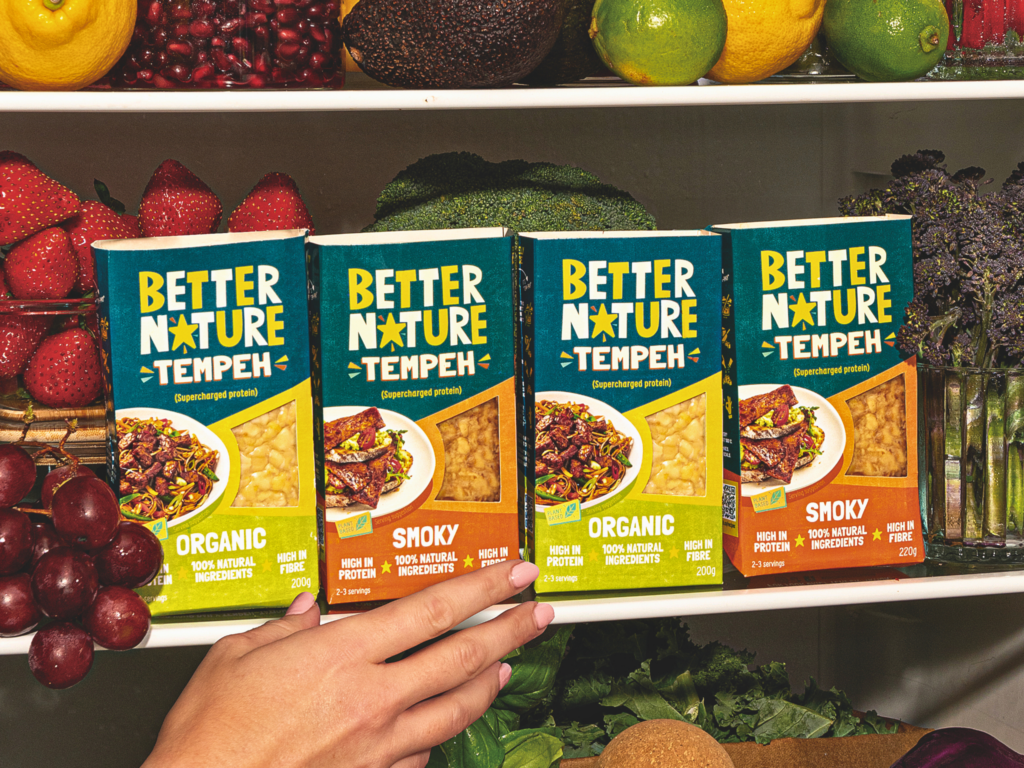
The UK eats twice as much meat as the global average, putting both public and planetary health at risk. The solution lies in plant-based whole foods, especially beans.
Making whole foods like beans more appealing and increasing the ratio of plant-to-meat sales in supermarkets are critical measures to drive a shift towards “less and better meat” and more plant-rich diets in the UK, according to a new report by the Food Foundation.
The charity’s analysis shows that Brits eat twice as much meat (83kg) as the global average (44kg), with adults aged 19-40 consuming the largest amount on average, followed by those in the 11-18 bracket. Chicken and turkey make up 42% of total meat intake, with red and processed meats each taking a 29% share.
“This is perhaps paradoxical given that younger adults are also often found to be most open to the idea of eating more sustainably, but may reflect a food environment and food culture that positions meat – especially chicken – as a key source of protein (with an accompanying health halo) and a convenient and appealing meal option,” the report says.
That said, meat purchases fell by 13% between 2018-19 and 2022-23, leading some to suggest that the UK has reached “peak meat”. While the decline is encouraging, it’s unclear whether this is a temporary response to the cost-of-living crisis or the beginning of a longer-term trend, the Food Foundation said.
With research showing that half of British adults want to change the way they eat, either by adding more plants to their diet or cutting back on meat and dairy, the charity has called upon businesses and policymakers to take action to boost the uptake of plant-rich diets in the UK, with a focus on whole-food sources like beans.
Men eat way more meat than women

The report found that young men eat the largest amount of processed meat than any other demographic in the UK. They eat 20% more processed meat on average than women. In fact, a third of men’s meat consumption is processed.
Across the board, men “reliably eat more meat” than women, even when intake is adjusted for the lower amount of calories women consume on average. For example, men in the 19-40 age group consume 10g more red meat per day than women of the same age.
The Food Foundation highlight how meat-eating is often linked with masculinity, which has birthed attacks on men who eat plant-based diets as “soy boys”. “Meat-eating and diets that are high in protein have become a part of ‘gym bro culture’,” it notes. A recent study found that British men aged 16-24 are twice as likely to have increased their annual meat intake as men of all other ages, and 17% of young men feel uncomfortable eating plant-based food in public (versus 11% of all men).
It isn’t just men whose consumption of processed meat, classed as a carcinogen by the World Health Organization, is getting out of hand. Over a third (36%) of the meat eaten by children is processed, proportionally more than by adults.
The issue is compounded by the prominence of processed meat in restaurants and foodservice settings. All five of the most commonly eaten meat dishes at fast-food outlets are classified as red or processed meat.
It’s not like the Brits aren’t aware of the risks of meat-eating. For instance, the share of people who know that meat production and consumption pose a big risk to the planet increased from 31% in 2013 to 41% in 2024. However, there is an action-intention gap.
The Food Foundation cited research showing that while 47% of Brits believe eating less meat and dairy would help reduce climate harm, only 27% are consuming fewer animal proteins to benefit the planet. Similarly, despite six in 10 consumers being willing to cut back on meat, the share of those who eat it at least five times a week rose from 43% in 2022 to 50% in 2024.
This conflicting behaviour is particularly pronounced in young men. Nearly half (46%) of them acknowledge the environmental impact of livestock, though this age group has the lowest percentage of people who have reduced their meat intake in the last year (16%) and the highest of those who have been eating more (19%).
Companies and government officials need to back beans

To outline why the UK needs to address its overconsumption of meat, the Food Foundation pointed out that excessive meat intake is linked with obesity, cardiovascular diseases, type 2 diabetes, certain cancers, and other conditions.
Additionally, 63% of the country’s greenhouse gas emissions come directly from livestock. The largest contribution to diet-related emissions comes from animal products, even when these are produced using more sustainable production practices. To that point, it noted how “there is not enough land available to be able to continue to produce meat at the same levels, more sustainably”.
To help speed up the dietary transition, it is urging businesses to reduce their reliance on processed meat. Retailers could exclude these products from price promotions, and businesses could substitute them for beans and other plant proteins.
British supermarkets are lagging behind their European counterparts when it comes to setting targets to tilt the ratio of protein sales towards plants too, so this is another area that needs addressing. And as Lidl has done in some countries, retailers should ensure that plant-based meat is priced at the same level, if not cheaper, than animal protein.
Policymakers have an important role to play as well. They can strengthen government procurement rules for schools, hospitals, prisons, etc. to remove or limit the amount of processed meat and add more plants on the menu. They can also introduce mandatory reporting of protein and healthy food sales for large food businesses.
Another promising lever is to replace a small amount of meat and dairy in pre-prepared meals with alternative proteins or plant-based whole foods. The latter, in fact, formed one of the central recommendations of the report.
The UK government is being called on to support the increased consumption of fruits, vegetables, beans, legumes and pulses, with a strategy for an “expanded, vibrant, and thriving” edible horticulture sector. Meanwhile, businesses need to “make beans and whole plant foods more appealing”.
“Promotional spend ought to be redirected towards nutritious plant foods in order to make them more appealing. Advertising and promotional strategies should be focused specifically on beans as the most affordable, sustainable and healthiest plant-based alternatives to meat, where intake is not patterned by level of income,” the Food Foundation said.
Whole food: redefining the UK’s food landscape

The UK is an area ripe for whole-food innovation. Meals made from vegetables, beans and legumes have seen the highest net increase (46%) among the entire category in the last 12 months, much higher than meat analogues (34%).
A survey by Tesco, its largest supermarket, revealed that 22% of Brits want to consume more plant-based foods. Last year, the retailer said “veg-led meals” accounted for 40% of its plant-based sales, prompting it to go big on whole foods rather than meat alternatives in its vegan range for Christmas.
Sales of meat alternatives fell by 7% in the UK last year; meanwhile, tofu expanded its market share to reach 9% of households. Brands selling whole foods and traditional plant proteins emerged as the category’s success stories in 2024, as Brits soured on ultra-processed food.
The Tofoo Co, which was acquired by German private equity firm Comitis Capital last August following sustained growth, was the fourth-largest vegan brand last year, growing by nearly 19% in sales. Better Nature became the second fastest-growing meat-free brand in the UK, as sales of its tempeh soared by 457%.
Similarly, British-born Bold Bean Co, a premium jarred beans startup, won a £50,000 investment on Dragons’ Den at a valuation exceeding £650,000 last year, and has enjoyed a 306% year-over-year growth, according to its founder. The company’s mission to “make people OBSESSED with beans” received a significant gastronomic boost last month, thanks to a coveted collaboration with vegetable-championing F&B maestro Yotam Ottolenghi.
The bean segment has no doubt been buoyed by the Food Foundation’s finding that beans and grains are, on average, the strongest-performing foods on sustainability, nutrition and price fronts.
It underscores the opportunity for products like Oh So Wholesome’s Veg’chop and THIS’s Super Superfood, which pack legumes and vegetables in compact plant protein blocks.
And it’s not just beans that the UK is going nuts for. Government analysis shows that up to two-thirds of Brits are willing to try foods made via precision fermentation, highlighting the country’s openness to food tech innovations that deliver wins for the planet.
The post UK Urged to ‘Make Beans More Appealing’ As Meat Consumption Goes Into Overdrive appeared first on Green Queen.
This post was originally published on Green Queen.